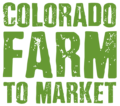Find out if you are covered by the FDA’s Food Safety Modernization Act (FSMA) Produce Safety Rule at www.coproducesafety.org.
Definition: Herbs are annual/biennial/perennial plants that are commonly used to add flavor, color, and aroma to foods and beverages. Herbs commonly sold at Colorado farmers’ markets include basil, chives, cilantro, dill, mint, parsley, rosemary, and tarragon.
Harvest/Post Harvest: Many of the same principles that apply to leafy greens production can also be used in herb production. See FDA Guide to Minimize Microbial Food Safety Hazards of Leafy Greens.
Food Safety: As with many other types of fresh produce, fresh herbs may be exposed to a wide range of microbial contamination during pre- and post-harvest and fresh herbs have been associated with foodborne illness outbreaks. Contamination of herbs from the fields can come from the natural environment, fertilizers containing manure, contaminated irrigation water, poor worker hygiene and animal contact. Post-harvest contamination may come from tainted harvest equipment, rinse water, improper storage and processing. Following Good Agricultural Practices (GAPs) can help reduce the chance of foodborne illness outbreaks.
Distribution Method | Collapse All)
You are selling your product at a farmers’ market, CSA, roadside stand, or other direct to consumer outlet
If you are selling fresh herbs that you have purchased directly from a Colorado grower or from a wholesaler, you will need a Farm Product Dealers License.
Labeling: No specific labeling requirements. Unpackaged, single ingredient foods like fruits and vegetables do not need labels.
Sales Tax Liability: General sales tax information.
Weights and Measures: If you are selling your product by weight, you must follow the Colorado weights and measures requirements. Fresh herbs might also be sold by count, refer to the fruits and vegetables section of weights and measures for guidelines.
You are selling your product to a store, restaurant, food cart, K-12 school, university, hospital, or other retail food establishment
Labeling: The state does not require specific labels, however your buyer might have specific requirements. Check with your buyer for product identification and traceability requirements.
Sales Tax Liability: General sales tax information.
Weights and Measures: If you are selling your product by weight, you must follow the Colorado weights and measures requirements. Fresh herbs might also be sold by volume, refer to the fruits and vegetables section of weights and measures for guidelines.
Value Added Products: Dried herbs, herb-infused vinegars and oils
Related Links:
- FDA Guidance to Minimize Food Safety Hazards of Leafy Greens
- Information about medicinal herbs: Herbals for Health
- Leafy Greens Marketing Agreement (LGMA)
